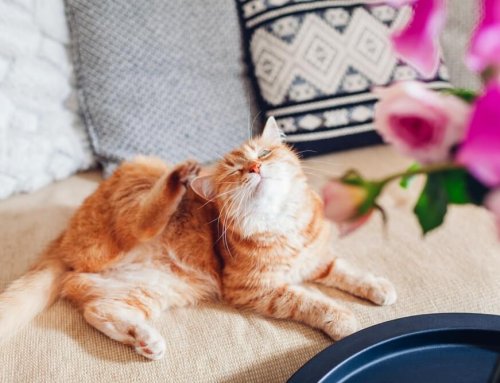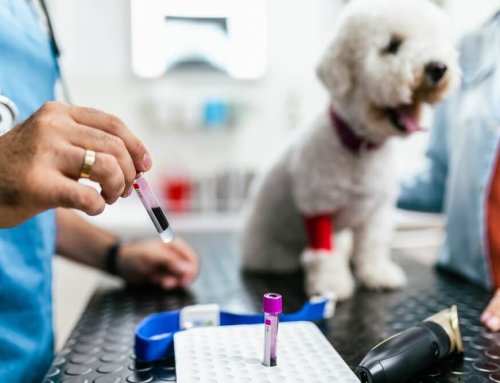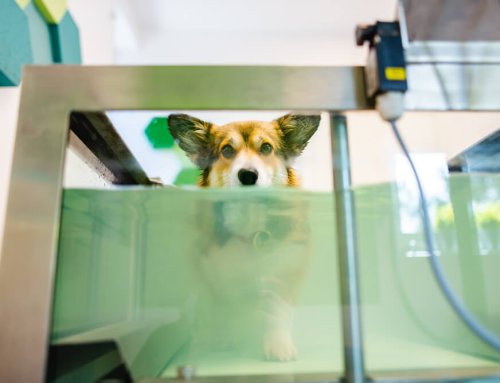Accidental poisonings are common in pets, and can occur despite the most attentive pet owners. Toxin exposure is considered a veterinary emergency, and can lead to serious, potentially life-threatening, health complications, so our 360 Pet Medical team wants to protect your pet from potential poisoning. We follow Sadie, a 2-year-old black Labrador retriever, as she encounters several dangerous pet toxins.
Pets in the kitchen
Sadie: “The kitchen is one of my favorite places. I’m often hungry and ready for a snack. Let me see what’s on the counter.”
360 Pet Medical: Sadie’s voracious appetite may be a problem if she finds a toxin when searching for a snack. Several common foods are toxic to pets, including:
- Chocolate — Chocolate in all forms, especially dark chocolate, is toxic to pets, causing restlessness, gastrointestinal (GI) upset, increased heart rate, and possibly seizures.
- Sugar-free foods — Sugar-free foods that contain the artificial sweetener xylitol can cause extreme hypoglycemia in pets.
- Grapes — Grapes, raisins, and currants can cause kidney damage in pets.
- Allium vegetables — Vegetables such as onions, garlic, shallots, leeks, chives, and scallions can damage red blood cells, leading to anemia.
- Macadamia nuts — All nuts are high in fat and can trigger a serious condition called pancreatitis in pets, but macadamia nuts can also cause weakness, depression, vomiting, hyperthermia, and tremors.
Advice for Sadie’s owner to protect her from toxic foods includes:
- Never store food on your counter to prevent counter surfing.
- Store all garbage behind latched doors or in sealed containers that can’t be upturned.
- Read product labels before giving your pet a new food.
- Never give your pet table scraps.
- Use child-proof latches to intercept curious paws.
- Ensure your pet doesn’t steal food from guests’ plates.
Pets and purses
Sadie: “My owner keeps the best treats for herself. I’m going to look in her purse to see what I can find.”
360 Pet Medical: Rummaging through your owner’s personal belongings is bad manners, Sadie, and you can encounter a medication that can be toxic to pets. Every medication is potentially dangerous, including:
- Non-steroidal anti-inflammatory drugs (NSAIDs) — NSAIDs, such as ibuprofen, can cause GI ulceration and kidney damage in pets.
- Acetaminophen — This common pain reliever can cause liver damage and decrease the red blood cell’s ability to carry oxygen. Cats are especially susceptible to acetaminophen toxicity.
- Antidepressants — Medications such as selective serotonin reuptake inhibitors (SSRIs), tricyclic antidepressants (TCAs), and monoamine oxidase inhibitors (MAOIs) can be toxic to pets. Signs include changes in mental status, elevated body temperature, cardiac arrhythmias, muscle tremors, and seizures.
- Blood pressure medications — Medications such as angiotensin-converting enzyme (ACE) inhibitors and beta-blockers that are used to treat hypertension can lead to extremely low blood pressure and heart rates.
Advice for Sadie’s owner to protect her from dangerous medications includes:
- Keep your medications in a secure location that your pet can’t access.
- Always consult our veterinary team before giving your pet medication.
- Secure purses and coats, so your pet doesn’t search the pockets and find toxins.
- Take your medication in a separate room, so your pet can’t eat a pill that you drop.
Pets and medication
Sadie: “My owner gives me these yummy treats once a month. I’m not sure why I can’t have them more frequently, but I know where she keeps them, so I may loot her stash.”
360 Pet Medical: Many veterinary medications, such as heartworm preventives, are produced as tasty chews to entice pets and help owners administer the product, but your pet can be tempted to take more than they should. We advise Sadie’s owner to protect her pet from veterinary medications by:
- Storing all veterinary medications in a secure location that your pet can’t access
- Never giving your dog your cat’s medication
- Never giving your cat your dog’s medication
- Consulting our team before giving leftover medication to your pet whose condition seems to return.
- Giving medication only to the pet for whom they were prescribed
Pets and plants

Sadie: “Flowers are so pretty, and sometimes I want to see if they taste as good as they look.”
360 Pet Medical: Some pets have an affinity for chewing on vegetation, but many plants are toxic to pets. Examples include:
- Lilies — All parts of the lily, including the vase water, are toxic to pets. Dogs typically experience only GI upset, but cats can develop severe kidney failure.
- Aloe — Aloe vera contains compounds that encourage bowel movements when ingested, causing vomiting and diarrhea.
- Tulips — Tulip bulbs are especially toxic to pets. Small doses can cause profuse drooling, vomiting, and diarrhea, and large amounts can cause increased heart rate and difficulty breathing.
- Foxglove — Foxglove contains naturally occurring toxins that affect the pet’s heart, causing signs that include cardiac arrhythmias, heart rate changes, GI upset, electrolyte abnormalities, muscle tremors, and seizures.
Advice for Sadie’s owner to protect her from toxic plants includes:
- Educate yourself about which plants are toxic to pets.
- Ensure all plants in and around your home are pet-friendly.
- Remove any toxic vegetation in your yard, or ensure your pet can’t access the area.
Many pets have Sadie’s inquisitive nature, but these tips should help protect your curious four-legged friend. If you know or suspect your pet has been exposed to a toxin, contact our 360 Pet Medical team, so we can determine the best strategy to address the situation.








Leave A Comment